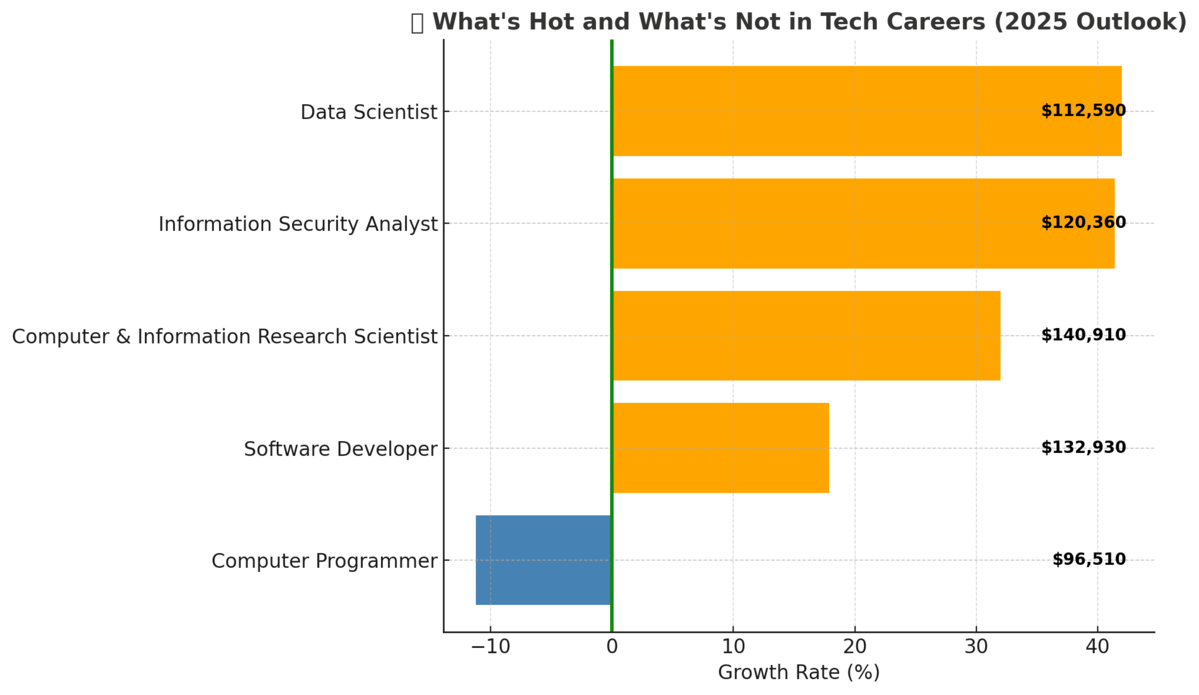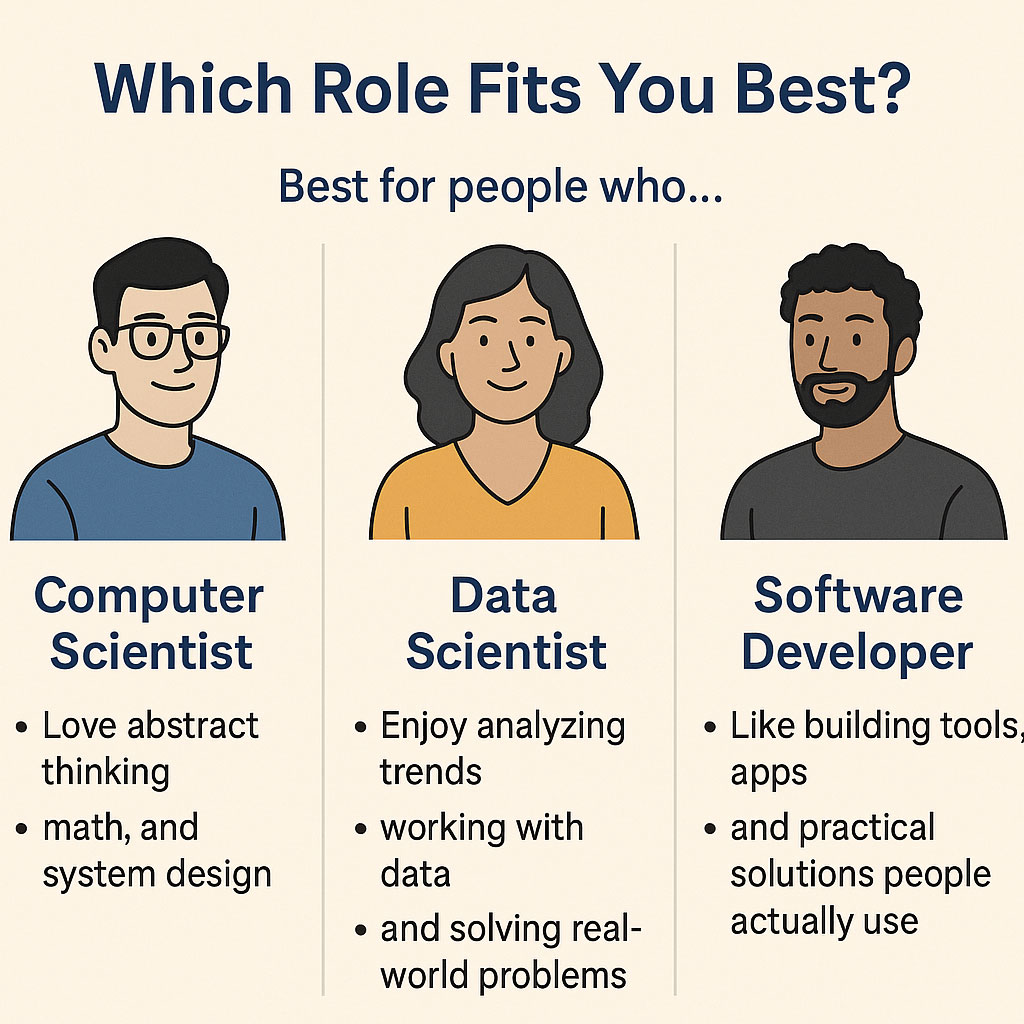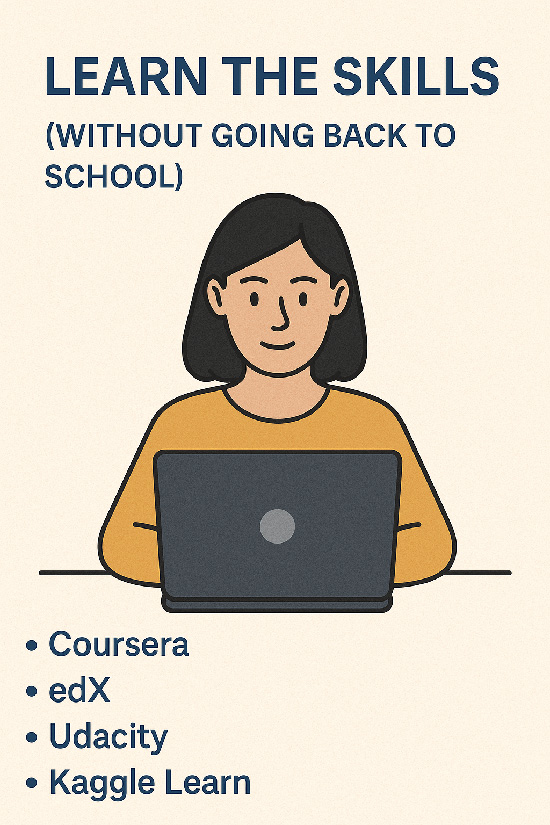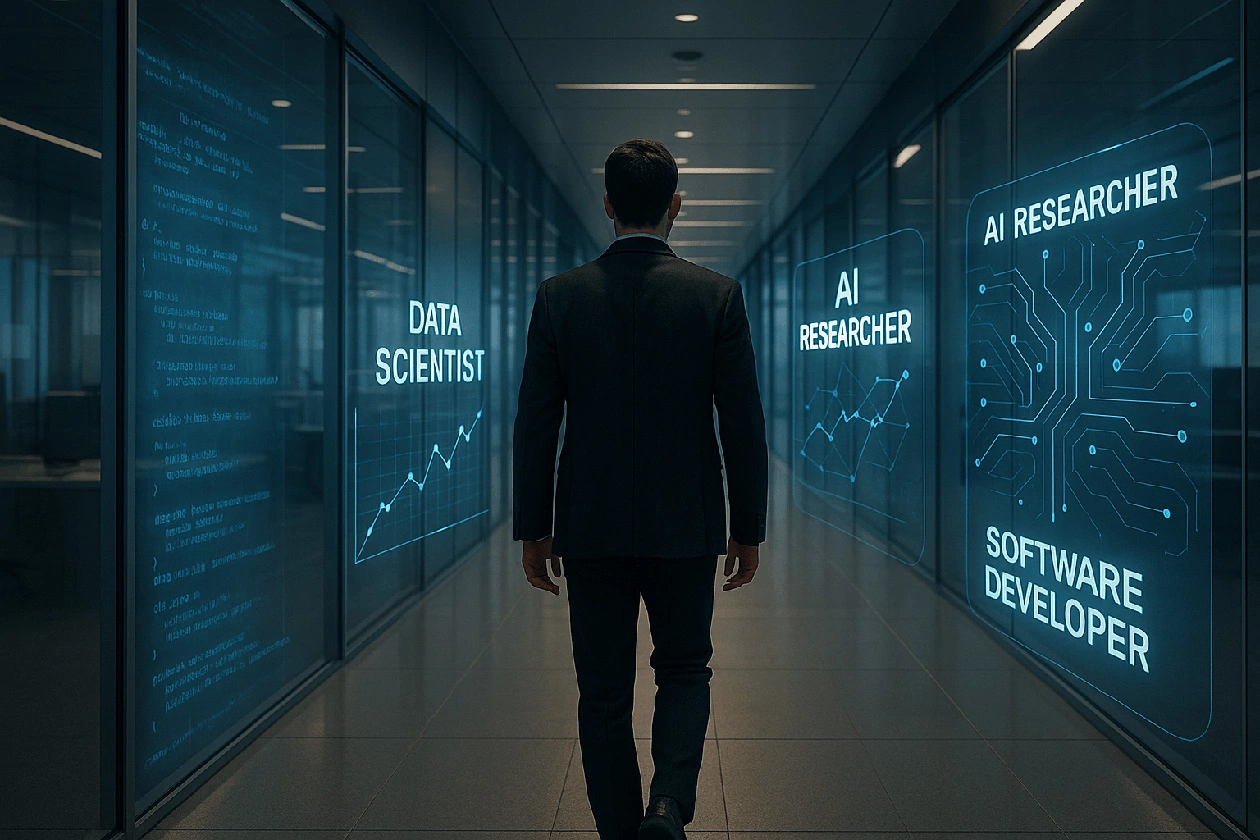Now hold on—wasn’t artificial intelligence supposed to be taking over tech jobs? So why are some tech careers rocking more than ever right now?
The answer is both complex and exciting. Sure, routine coding roles feel like they are in a mass extinction event. JavaScript writers replaced by copy-pasters. AI can write, test, and optimize boilerplate code in seconds—for free. And, it will never be worse than it is today.
But on the other hand, high-level technology jobs like data scientists, AI researchers, and software developers are booming—to the tune of 42% growth. And not just in demand, but in salary, too. According to the Bureau of Labor Statistics, these are the roles shaping the future of AI innovation. So yes, maybe you’ll go the way of the dinosaur eventually (dramatic scene of AI robot coming over and firing you) —but right now, if you’re in these tech jobs, you’re positioned to rake in the gold.
The Shift: What’s Hot, What’s Not
Here’s the short version: AI isn’t replacing all tech jobs—it’s replacing parts of them. Specifically, it’s cutting out the repetitive, low-level tasks: writing basic functions, debugging simple errors, or stitching together boilerplate code. That’s why roles like computer programmer are in decline, with the BLS projecting negative growth over the next decade.
But here’s what’s hot: jobs that design, train, and scale AI systems—not just use them. That includes data scientists (+42% growth), AI research scientists (aka Computer and Information Research Scientists) (+32%), software developers (+17.9%), and cybersecurity analysts (+41.4%). These roles require higher-level thinking: pattern recognition, model refinement, system architecture, and ethical oversight. All the stuff AI can’t do on its own.

Why does AI seem to like some careers?
Like a case study, let’s take a look at the computer scientist—one of the best examples of a job not being replaced by AI, but actually becoming more valuable because of it.
We first need to understand what a computer scientist actually does. These aren't people just writing if-then statements. They're the architects behind the systems that power AI, machine learning, cybersecurity, and even quantum computing. They design the algorithms, build models, solve complex computing problems, and lead the research that becomes the next wave of innovation.
They’re not just coding nerds. They’re big-picture problem solvers, asking questions like: How can we train AI to detect medical fraud? How do we reduce algorithmic bias? What's the best structure for a neural network in a self-driving car? These are problems AI can’t solve on its own.
And that’s exactly why computer scientists are in demand—with 32% projected growth and a median salary of over $140K, according to the Bureau of Labor Statistics. Think of it this way: AI is great at running functions—until something breaks. It can’t always operate on itself that well (yet). That’s where the computer scientist steps in.
Computer Scientist

- What they do: Invent algorithms, build advanced systems, and design the core logic that powers AI, robotics, and secure computing.
- Where they work: R&D labs, government agencies, academic institutions, deep tech companies.
- Why AI needs them: AI doesn’t build itself. Computer scientists design the frameworks AI depends on—making them essential and future-proof.
Now let's take a look at two other AI-boosted careers not quite as hot at the computer scientist but still booming. Maybe one of these roles is right for you.
Data Scientist

- What they do: Analyze massive datasets to discover trends, make predictions, and guide business decisions—often using machine learning tools.
- Where they work: Practically everywhere—finance, health tech, e-commerce, logistics, and beyond.
- Why AI needs them: AI learns from data. Data scientists prepare, refine, and interpret that data to make sure the AI delivers useful, ethical, and accurate results.
Software Developer

- What they do: Build the applications and digital experiences people use every day—websites, mobile apps, platforms, and backend systems.
- Where they work: Startups, tech giants, enterprise IT, freelance platforms—you name it.
- Why AI needs them: AI models are useless without real-world implementation. Developers integrate AI into user-friendly products and scale it to millions.
Think of these three careers as the “AI gods” (small g). They each play a significant role in AI’s creation.
- Computer scientists build the AI.
- Data scientists teach the AI.
- Software developers bring the AI to life.
How to Get Your Career Started
So you want to break into one of these high-income, AI-powered tech roles. Good news: even though these jobs are advanced, it’s more doable than you think. They’re no longer locked behind PhDs or four-year CS degrees. These days, it’s all about skill-based hiring—and that’s been reshaping the tech world fast.
If you can prove what you can do, you’re in.

Which Role Fits You Best?
Well, there are actually some real personality and preference differences in each.
Yeah, that’s right—nerds have personalities.
(I’m also a nerd, by the way. So I can say that.)
Here’s a quick snapshot:
If you’re not sure about your work personality strengths, I highly recommend you take 10 minutes and head over to CareerFitter.com.
They’ve been helping millions of people match with the right careers—based on personality and aptitude preferences — for over 25 years. Tell them I sent you. That actually won't get you anything but I thought it sounded cool.
How To Get This Stuff in Your Head
(Aka education and experience)
I think I’m about to rock your world with a ton of research on how to get started. Just remember me when you’re rich.
Whether you're brand new to tech or leveling up mid-career, these are the tools, platforms, and communities that can help you break into these high-income, AI-powered gigs—without wasting time or money.
1. Learn the Skills (Without Going Back to School)

🔹 General Platforms (All Roles)
- Coursera – University-backed courses from Stanford, Google, IBM
- edX – MIT, Harvard, and top-tier courses with certificates
- Udacity – Nanodegrees in AI, data science, and more
- Kaggle Learn – Hands-on, browser-based Python and ML tutorials
2. Role-Specific Training Paths
🔹 Computer Scientist
- MIT OpenCourseWare – Intro to Computer Science
- CS50 by Harvard – Free, rigorous intro to computer science
- DeepLearning.AI – Courses on building modern AI from scratch
🔹 Data Scientist
- IBM Data Science Professional Certificate
- DataCamp – Learn Python, SQL, and machine learning interactively
- Google Advanced Data Analytics Certificate
🔹Software Developer
- freeCodeCamp – 100% free, project-based curriculum
- The Odin Project – Full-stack web development bootcamp
- Scrimba – Interactive JavaScript and React courses
3. Find a Mentor or Community

Learning solo is hard—these communities give you feedback, support, and job insights.
- ADPList – Free mentorship sessions with tech professionals
- CodeMentor – 1:1 coaching from developers and data scientists
- Women Who Code – Global nonprofit for women in tech
- r/learnprogramming – Peer help and code reviews
- GitHub – Collaborate, contribute to open-source, and build your portfolio
4. Get Real-World Experience (Internships & Projects)
🚀 Internships & Job Platforms
- Pathrise – Career accelerator with mentorship + job search coaching
- Internship Listings at BuiltIn – Tech internships by city
- Handshake – Internship portal used by 1,400+ colleges
- AngelList Talent – Startup jobs, internships, and apprenticeships
📂 Freelance & Gig Experience
- Turing – Remote jobs for vetted developers
- Upwork – Start building paid experience fast
- Fiverr – Offer microservices (data cleaning, automation scripts, etc.)
📈 Project-Based Portfolios
- Kaggle – Enter competitions and publish data science projects
- DevPost – Join hackathons and showcase your work
- Hashnode – Blog your tech journey and build your developer brand

Now, go get started on your new future—and remember, your job might be safe for now, but there’s no guarantee how long that’ll last. Eventually, AI will learn to build AI (yes, we've all seen Terminator). But, when that happens… You’ll roll with it. You’ll reinvent yourself. You’ll upskill to the next level.
Or… save your money, buy an island, and watch it all from your private beach. Either way, you’ll be ready.
This career test will find out if these careers match your personality.



.png)










